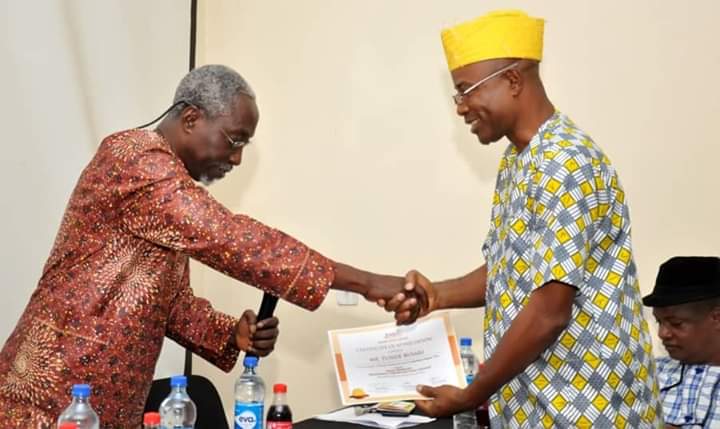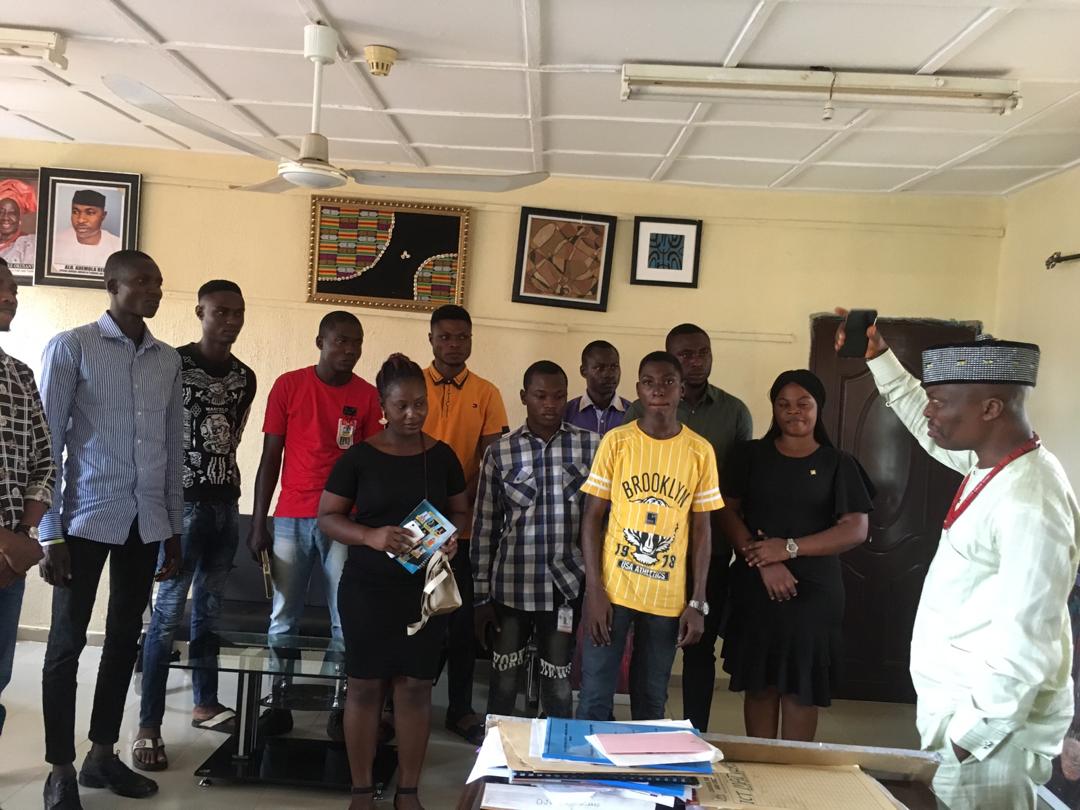A Paper presented by Tunde Busari at Journalists Hangout organised by Ibadan Media Limited at Kakanfo Inn, Ibadan, the Oyo State capital on July 28, 2019.
I consider the invite to be here today to speak on ‘Online Journalism: Professionals’ Concern For Ethical Standard’ first as honour and secondly as responsibility to rub mind with this respectable audience for the sake of our profession. It is my hope that at the concluding section of this paper, we would have picked one, two or more points to guide ethical practice of our dear profession.
I am delighted to open this paper by clapping for the organiser of this gathering, which is Ibadan Media Limited, for your genuine concern about our profession, our dear profession which is arguably passing through a hard time as a result of current state of technology, a development which is global.
I must say that when I received the message indicating that I would be invited to present this paper today, I could not commit myself because of my unpredictable schedule on and off Tribune House newsroom. However, I knew within me that I would not have a valid justification to decline the invite, which is aimed at discussing a germane issue on our profession. And here I am now standing before this distinguished audience comprising practising and trainee journalists. Glory goes to God for making it possible for me to match my intention with my presence today.
Having said that, I want to crave your permission to treat this topic from the angle of a reporter who shuttles from field to newsroom, back to the field and return to the newsroom. I found this approach inevitable based on the following reasons:
One, Journalism trainees in our midst would find reporter’s approach easy to relate with, in terms of understanding the nitty-gritty of media practice.
Two, some academic institutions are now offering appointment to practising journalists in their Mass Communication department with a view to bringing practitioners’ on-the-field knowledge to their students.
And since journalism, according to my over a decade work experience, is more a practical profession than theory-based, it is, therefore, imperative to treat this topic as such for the above stated reasons.
Permit me also to look at what is called Online Journalism from two sides. You would agree with me that one of the fundamental ethics which guides our profession compels us to explore two sides of our story. Doing this, the ethics teaches, will satisfy the principle of balance and unbiased reportage. So, if journalism is said to mean a thankless profession, this comment should be seen as a complimentary remark emphasising principle of balance which ties reporter to no side of his story.
A reference here! In 2008, I published a crime story when I was an editorial staff of Sunday Punch. The story satisfied my editor and the management of The Punch for its strict compliance with balance and fairness to all sides involved. However, the same story turned me a victim of insult from both parties in the stories with each simultaneously accusing me of bias in favour of the other.
Back to the main lane, I think I should rather see Online Journalism from asset and liability angles. I hope the Economists among us would pardon me for the use of their lexis. But in the strict sense of it, I don’t think I need a permission to use any word from any profession because Journalism ethics also teaches and encourages practitioners to know a little in everything. That is the significance of Specialized Reporting which interestingly schools of Journalism now teach students to prepare their mind for challenges ahead of them on the field and in the newsroom where a reporter can be assigned by editor to report any beat.
What is Online Journalism?
I have read quite a number of definitions of Online Journalism since the explosion of this digital device in Nigeria a little above a decade ago. Significantly, all of these definitions tend to say the same thing, which is use of computer and internet facilities to disseminate news to the reading public. My definition here is not going to import a different sense, except that it is going to provide more explanation to those I have come across and read. Therefore, Online Journalism is a 20th Century innovation which derives its strength from making news available to final consumers through internet facilities. Online Journalism is evidence of progress achieved in technology to make life easier to the world.
Historically, according to Brain Mass, a company which provides academic assistance through internet since 2001, the Department of Journalism of the University of Florida in the US launched the first Online Journalism site in October 1993. Further development of the site by the school eventually led to more changes in news reporting.
With Online Journalism, one can now read news, features, opinions which are published by different newspapers and magazines in his or her bed using his or her Android phone loaded with enough data sold by internet service providers. That is why some media analysts, including scholars, describe it as Paperless Journalism. There is no doubt that Online Journalism poses unavoidable threat to traditional Journalism which is also called Paper Journalism. And this threat can be better understood from the perspective of dissimilarity between traditional and Online Journalism.
What are the differences?
The first thing that naturally comes to mind in this sub-topic is the medium which both used to make their content available to the reading public. While traditional journalism reaches the public through texts printed on newsprint, Online Journalism disseminates news, features and articles through computer network.
Secondly, traditional Journalism usually struggles for space to accommodate its content because of limited pagination which is determined by cost of production, whereas Online Journalism has the luxury to publish lengthy news spiced with colourful pictures without restriction.
Thirdly, traditional Journalism is very strict on deadline to go to press. But this is not the case in Online Journalism as reporters have luxury of time to write and rewrite until they are satisfied. The only caveat to this freedom, however, is when the online reporters are in a rush to break news ahead of other competitors.
Finally but not limited to this, traditional Journalism survives without a need by readers to switch on computer, laptop or mobile phone to enjoy the content, whereas Online Journalism is solely dependent on availability of internet service, failure of which renders it non-existent to readers.
Why Online Journalism is inevitable
Media development analysts must have envisaged the challenge which the traditional Journalism currently faces from Online Journalism based on the realisation that content, rather than medium on which the content is printed and published, is most important in effective mass communication.
And the fact that the entire world is showing interest and drawing global attention to environmental issue, especially on protection of our environment from further deforestation, endangers the survival of traditional Journalism. You may want to ask of the connection between environment and traditional Journalism.
The answer is very simple in that newsprint on which text of news is printed is produced from trees hewn from the forest, a process which soak up harmful greenhouse gasses and produce breathable air. The end result is acceleration of climate change.
Findings revealed that Paper manufacturing is the fourth largest emitter of greenhouse gasses among U.S. manufacturing industries, for instance. Aside that paper industry is the third largest industrial consumer of energy, it is also the fourth largest consumer of fossil fuels among manufacturing sectors.
Given the above reason, Online Journalism, which has no direct impact on environmental degradation, is a better alternative. Of course, to a good number of news consumers world over, reading a hard copy offers more pleasure than reading a digital copy, but if the ecological impact of printing newspapers is clearly explained to them, it is a matter of time they would also key into reading digital copy without no need to litter their homes with a heap of old hard copies of newspapers and magazines.
Professionals’ headache
There is a strong doubt that professionals, who have paid their dues in Journalism, would sit back and smile at the way some practitioners of Online Journalism are undermining the ethics of the profession, a trend which was nonexistent during the hey days of traditional Journalism, specifically in the period before 1993. The professionals are naturally bound to be worried because if they are not worried, there is tendency for these invaders of the profession to subject it to uncontrolled bastardization and make the profession unattractive to the decent ones in the society.
It is important, at this juncture, to highlight a number of areas where Online Journalism is endangering media profession, and where prompt and appropriate actions should be taken before ethical media is killed, buried and forgotten.
(1) Plagiarism- One act, which destroys a reporter’s career more than any other crime, is copying stories written and published by another reporter or author and claiming credit for the story. This act is generally condemned as much as culprits, hence media organisations’ regular warning against it because of its effect on the image of their newspapers and by extension their sale and advertisers’ patronage. In this age of Online Journalism, however, plagiarism is a fad, especially among some sections of bloggers who see no reason they should not rob Peters and pay Paul in the competitive market. On some occasions, I have fallen victim of this scourge, seeing my works copied and pasted with no mention of my name as original author. Some of you may have also found yourself in the same shoe and also took a walk as I did.
(2) Unverified Stories-Ethical standard of Journalism does not compromise going to press with stories which are not authenticated as non-fiction. It is an obligation for every reporter to confirm the genuineness or otherwise of his or her story even before submitting to line editor. This sacred rule, however, is suffering erosion with the prevalence of the so-called citizen journalists. Some of these online journalists lack required patience to verify a mere rumour, which is cooked up by faceless elements, to cause public chaos in the country. In their exclusive realm, the common phrase is ‘everything goes!’ This practice featured alarmingly during 2015 and 2019 general elections in Nigeria when conflicting results were published by different online media, even while counting of votes was ongoing. That infraction brought a lot of embarrassment to the Independent National Electoral Commission, (INEC) and also put a question mark on the results which the body eventually declared, thereby setting a stage for stiff contest of results among political parties. Just last Thursday, a Punch columnist, Abimbola Adelakun lamented on how news of her alleged detention by the Protocol of the Coza, that popular Abuja church, was misrepresented to raise needless alarm in the social media.
(3) Bias Reports- Exploring all sides of a story gives reporters what should be called helicopter view of the body of the stories without being judgmental. A reporter is not expected to infuse his or her opinions into stories. It is the right of the reading public to determine who is saying the truth and who is withholding it. Unfortunately, Online Journalism allows practitioners to disrespect this ethics as it pleases their whims and caprices. As sooner as a side of a story is heard, they rush to their computer and feed their readers the stories without considering the damage such stories would do to the image and reputation of the neglected side.
(4) Deliberate Falsehood-This shares close affinity with unverified report highlighted earlier. The difference, however, is intention. While reporters of unverified stories can be said to be handicapped by some circumstances before going to press, some reporters under this are agents of lies with a single mission to spread falsehood to achieve their marginal goal. I even learnt regrettably that there are some blogs exclusively dedicated to spread falsehood to pollute peaceful air of the area of their target readers. Example of this category is found in those who deliberately attach names and pictures of famous writers and personalities to certain articles simply to drive traffic to their sites. Professor Wole Soyinka and the late Military Governor of the defunct Western State, General Adeyinka Adebayo are two instances which I can recollect now, whose names were attached to articles they did not write.
(5) Lack of understanding of libel law-Some Online Journalists lack basic knowledge of libel law, hence they publish malicious stories which easily damage reputation of their objects and compel the latter to drag them to court and seek redress.
(6) Faceless entity- While traditional Journalism is practiced with reporters covered by a company with verifiable office sited in conspicuous location, some Online Journalists operate fictitious offices, which cannot be traced to make them accountable for their misdeeds. And they hide under this reason to perpetrate unethical practices.
(7) Poor use of English Language-Simply because Online Journalism is for all comers, regardless of having been trained or not, it is not surprising to read all sorts of unintelligible stories also written in unpardonable language which could make one vomit. Starting from headline to concluding paragraph, English Language is helplessly murdered.
Recommendations
We, practitioners, may be expressing concern on this subject from this afternoon till eternity. It cannot and will not be enough a solution except we do the following which I consider as panacea to the challenge.
(1) Traditional or Paper Journalists must launch heavy presence in digital world. A Yoruba maxim cautions that should the sane abandon corpse of an insane’s mother to him for burial, he may mess the remains up. I am happy that almost, if not all, Nigerian traditional media organisations today have also opened online copy of their editions. This is one of the best ways to influence the quacks who hide under Online Journalism to learn how to cast headline and build stories from credible angle, for instance. Each of these traditional organisations should not restrict themselves to one site; they should create one or two more to force the quacks to use them not only as reference but also as online tutorial classroom.
(2) There is an umbrella body formed by Online newspapers in 2010 called ‘The Online Publishers Association of Nigeria’. This initiative is a good development for clear identity but the association should ensure strict compliance to ethical standard of Journalism by its members. Also, the body should adhere religiously with section of its constitution which imposes severe sanction on members found on the other side of the law.
(3) The reading public should be wary of the so-called breaking news because most of these pieces of news end up in falsehood which misleads the public and occasionally triggers trouble. Of course, how quickly a news organization gets its news published ahead of others outfits, is addition to its credibility. This urge, however, should not subsume balance and accurate stories.
Conclusion
In spite of the known evils for which a section of Online Journalism is notorious, there is no gainsaying the fact that it is the future of Journalism, especially as traditional media organisations have also gone digital. Although unstable electricity supply, which seems to be our permanent problem in this clime, can pose a frustration, indeed, Online Journalism is the future because:
(1) It saves cost of production.
(2) It is easily accessible.
(3) Its production is less cumbersome.
(4) It is fast.
(5) It responds to spontaneity and finally
(6) It is trendy.
Thank you so much for this opportunity. God bless you all!













